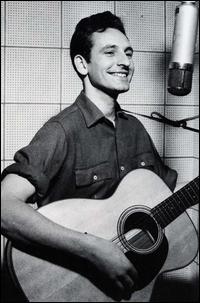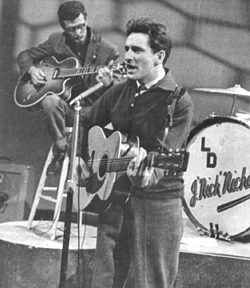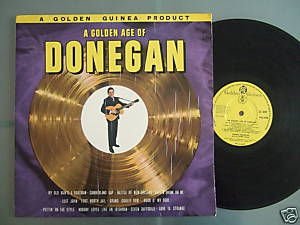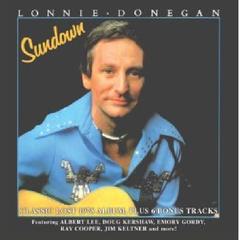
I have a theory which, like most of my theories, probably doesn’t stand up to close inspection, that those of us born in the early seventies were the first generation whose parents had cool record collections. My early years, like many of my contemporaries, were soundtracked by Elvis, Jerry Lee, Eddie, Gene, Fats, Chuck and countless twangy guitar expositions from the likes of Link Wray and Duane Eddy.
Because of this, I retain a dedicated affection for the music of the late fifties to this day, but there was always one name that baffled me.
My dad and his mates would speak in hushed and reverent tones about the first time they heard Lonnie Donegan. Added to this, when I later began to nurture a youthful obsession with the music of the 1960’s, I read that my fave raves (Beatles, Stones, Animals and so on) were all inspired to take their first tentative steps into the world of music by this diminutive Glasgow Irish Cockney with the curiously whiny voice.
I mean, I liked “Rock Island Line” but what kind of hunched,self loathing carapace of humanity doesn’t like that?
Later on, as I grew into a spectacularly pompous late teenager, I began to discover that Lonnie had nicked all his tunes from Leadbelly and Woody Guthrie anyway. I, I used to say, unaware of what an arse I sounded, preferred the originals, recorded in the dustbowls and penitentiaries of 30’s and 40’s America because they were the authentic sound of the poor and downtrodden. How I managed to arrive at a notion of what the poor and downtrodden sounded like from my 18 years of living a happy and comfortable life in a detached house in West Yorkshire I forget , but you can see what a snobby little twerp I was becoming.
Certainly I was unable and perhaps unwilling, to reconcile this funny little fella with his cod music hall tunes about chewing gum and dustmen peppered with annoying,unfunny asides (“My Dustbin’s full of toadstools, How do you know it’s full? Because there’s not mush’room inside” being a particularly egregious but by no means unique example) with the vital and sexy popular music which was then, as now, taking over my every thought and deed.

So far,so wrong until 1992 when the NME released a compilation, the name of which escapes me, to celebrate it’s 40th anniversary. Some clever Johnny had hit upon the idea of getting the popular beat combos of the day to record their favourite of the numerous singles that had topped the British charts, also celebrating it’s 40th anniversary that year . Some elected to take the whole thing seriously and turned out versions of their heroes’ work with varying degrees of success (The Jesus and Mary Chain’s eldritch take on “Little Red Rooster” being a good example, Jesus Jones’ attempt at Hendrix’s “Voodoo Chile” being a bad one), others decided to have a laugh and take the piss a bit (such as EMF’s breakneck version of Joe Dolce’s affectionately racist “Shaduppa You Face“)
The exceptions to this rule of thumb were a version of “The Legend of Xanadu” by the Fall,who just decided, as they do with all their cover versions, to turn it in to a Fall song and The Wedding Present’s one and half minute gallop through Lonnie’s “Cumberland Gap“. Full of the frenetic distorted strumming I had come to love them for in the preceding years, Gedge and co. rendered this geographical hymn to the Appalacian landmark as a clangorous knees up, brimming with the kind of freedom and abandon which I loved and I was hooked.
I played this track over and over until eventually after time (then as now, you see, I was not what you’d call “quick out of the blocks ” mentally) I realised that there might be some innocent fun to be had in hearing the original version.

Holding my breath so as not to make a sound I crept down the stairs in the dead of night and carefully removed a record called A Golden Age of Donegan on the Golden Guinea label from my dad’s record collection and with the grace of a young Nureyev tiptoed back upstairs to enjoy my ill gotten treasure (Actually, I just asked my dad if I could borrow it and he said yes, but I’m trying to build some atmosphere here).
Although it contained the previously alluded to “My Old Man’s a Dustman“, this record was a revelation in an age of over produced ballads clogging the charts (1992, students of pop culture will know,was the year that Whitney Houston’s merciless destruction of Dolly Parton’s “I Will Always Love You” dominated the charts like a Robert Mugabe of pop). “Cumberland Gap” was there, but instead of the fuzzy rollercoaster of the Weddoes’ version, this was different.
Lonnie sounded possessed by some benign spirit of the dustbowl – getting faster and faster , taking gulps of air on the first word of the title so it sounded like “Huuuurggghumnbland Gap!“, bringing in the guitar solo with a guttural flurry of vowels and consonants that sounded like someone trying to pronounce the board off Countdown. It sounded like this.
“Waaarghwarghdennyaramaghagitarrrrrrr!”
and remains my favourite recorded noise in all of music, and then after the belting final note which he does about four times and then keeps going, it stops with a cymbal crash.
Even now, there’s a second just after it stops where you, disorientated and slightly alarmed, can’t quite believe what you’ve just heard. What a record!  I was so taken aback that I moved the needle to the final track on the LP, that Dustman atrocity. Surely this wasn’t the same man ?  The resultant feeling of confusion was what I imagine associates of Superman feel when they see Clark Kent without his glasses and think “Hang on a minute…”
After this epiphany I became an avid Lonnie fan seeking out his recordings with fervour, and while I found a lot of mockney tosh comparable with “Dustman” I was also introduced to the delights of “Lost John” with it’s “If anybody asks yah who sang this song/Tell’em Lonnie Donnegan’s been here an gone” rejoinder, the haunting “Ramblin’ Man” which is as eerie and skeletal as anything Woody ever did, the frankly filthy “Diggin My Potatoes” the unhinged “Frankie and Johnny“, a record which John Peel used to play to visiting noise rock bands and delight at watching their faces fall into masks of awe, and at the top of my personal tree of Lonnie faves his weary, yearning version of Lonnie Johnson’s “Rocks in My Bed” from the 1957 LP Lonnie.
Lonnie himself fell out of favour in the early sixties, overtaken by the grittiness of the R&B bands in the South and youthful vigour of Merseybeat in the North and fell into producing records and writing songs for Tom Jones until 1978 when he emerged, flanked by a coterie of those he had influenced, with an LP called Putting On The Style which saw him return to some of his former hits Seventies style and is about to be re-released by Universal along with the contemporaneous but less star studded LP Sundown.

Lonnie seems to be having a whale of a time on these two records, especially the former, and seems to have lost none of the infectious hutzpah that characterised his hits. The problem with Putting on the Style is that it attempts to fix something that isn’t broke and producer Adam Faith (yes, that one) seems intent in ensuring that every one of the superfluous “special guests” gets a turn in the spotlight, hence the fact that, while Rory Gallagher is undoubtedly an excellent guitarist, his guileless note spraying across “Rock Island Line” just detracts from the song. This approach continues to obliterate the startling dynamics of which Lonnie was a master. Everything is just loud and busy and Lonnie’s stuck in the middle, restricted to doing Karaoke versions of his hits. This seems to abate on “I Wanna Go Home” which starts with a solo Lonnie, but the alarm bells start ringing 30 seconds in, when an electric piano appears of the kind that graced The Bee Gees’ slower tunes of the period. Why?
Then a string arrangement comes in that would have caused Meatloaf to turn to Jim Steinman and go “That’s a bit much, innit?“. Lonnie does hit an amazing high note towards the end which just serves to underline the folly of drowning this rootsiest of singers in production frippery.
“Frankie and Johnny” is then knocked our in the style of the Quo, and while there is no greater admirer of prime period Rick and Francis than me, the genius of the original just helps to underline the perfunctoriness of this version.
There is a decent version of Sleepy John Estse’s “Drop Down Baby” which I like possibly because I have no recollection of an original Lonnie version, but in general it’s a good natured failure which would have benefited from the exclusion of a few famous names,and whilst of interest to hardcore Lonnie lovers like myself, should be avoided by those not familiar with the man’s early work.
Putting on the Style was a hit though, prompting Lonnie to release another LP in 1978 called Sundown, also due to be reissued imminently, which lacks the stellar cast of the Putting On The Style and is therefore immediately better, although Adam Faith, still at the helm, chooses to throw everything at the wall to see what will stick.
The best tracks are the Leadbelly songs (“All Out and Down” and a revisting of “On A Monday” which shows what could have been acheived on the previous LP if only Elton John had elected to stay at home) and Lonnie’s own “Streamline Train” which rattles along agreeably in two seperate versions. The rest of the album sufferers from a dull choice of material, by John D Loudermilk and Gordon Lightfoot and a bunch of ennervating faux hoedowns contributed by Doug Kershaw. It’s also rather flat sounding as was the comtemporary country muisc of the time (think Kenny Rogers’ “Lucille” and you’re not far off) which again neuters Lonnie’s rootsier inclinations.
That said it’s good in the way that a record with Lonnie Donnegan on it is better than any record without him. He only recorded one more LP on his own before he died in 2002 (1999’s Muleskinner Blues) so it’s good that these are being released on CD so that the fans can hear them.


I didn’t know John Peel used to play “Frankie and Johnny” to noise rock bands. That is certainly my own personal favourite of Lonnie’s songs. Probably partly because the first time I heard it was on Radio 1 on the day Peel died, so it has a special connection for me – even after he died, Peel was still introducing me to the most amazing music.
I don’t know if you thought the same, but when I saw the cover of Putting On The Style, I thought Lonnie looked rather a lot like Neil Sedaka, although perhaps it was just the style of the time.
The name of that NME compilation was Ruby Tracks, and it turned me on to a lot of great music I hadn’t heard before being, as I was, 16 at the time.
I see you failed to write a piece without mentioning The Fall..! 😉
Yes, when BCB eventually gets round to doing ” A Saulte To Albert Freeman” at it surely must, one of my abiding memerioes would be, having been invited to DJ at the Polish Club last year and prepared what I though was a rather banging set of techno and dubstep with which to delight “the kids” , you playing Lonnie’s “Frankie and Johnny” and sitting there thinking ” I wish I’d done that”
I don’t say I woke up to the sound of Sundown every morning, but my Dad (who took me to see Lonnie live in Bingley c.1986) played it often enough that it’s only just occurred to me that it might be considered an obscurity rather than a record that simply everybody has in their collections. If I weren’t so concerned about my carbon footprint, I’d fly the 5000 miles to where my vinyl library is stored to check that my inherited copy of Sundown is still there.
I’ve always loved Lonnie’s version of “It Was A Very Good Year”. Sinatra’s is languid and boastful, but Lonnie seems slightly unnerved that the things he sings of actually happened to him.
I think I may have been introduced to Frankie & Johnny at the same time – was this when he mentioned Adam Faith and a host of other artists saying this was the record for a lead vocalist to aspire to ?